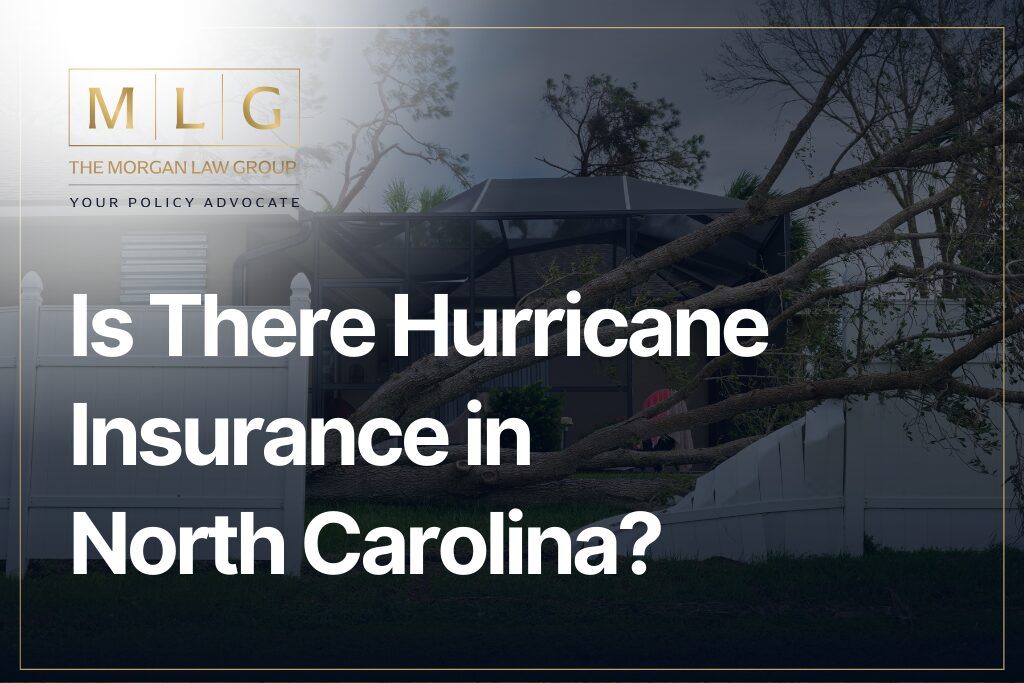North Carolina’s vulnerability to hurricanes places homeowners and business owners in the position of asking a seemingly simple question:
“Is there hurricane insurance in North Carolina?” “Yes.”
But the answer is often more involved than many expect. Technically, there is no single policy called “hurricane insurance.” Instead, hurricane insurance in North Carolina generally consists of a combination of windstorm insurance and flood insurance, both of which provide coverage for different aspects of storm-related damage.
The Morgan Law Group, an insurance law firm with over 25 years of legal experience, recognizes the complexity of hurricane insurance. If you are a policyholder looking to protect your property or to seek help from North Carolina hurricane insurance lawyers, keep reading to learn about how to secure comprehensive hurricane insurance coverage in North Carolina, how it costs, and what to expect when filing a hurricane insurance claim.
Importance of Hurricane Insurance in North Carolina
Hurricanes deliver two major threats: high winds and the possibility of storm surge or flooding.
Standard homeowners insurance policies often cover wind damage, but they can come with special provisions or exclusions related to named storms. At times, standard policies may not be enough to address the distinct hazards of hurricanes.
That’s why many policyholders explore a separate windstorm policy and a separate flood insurance policy. Combined, they serve as the equivalent of hurricane insurance.
Windstorm insurance typically covers damage to your property’s structure (and sometimes personal belongings) caused by high winds, including those from hurricanes. In certain coastal areas, you may need a standalone wind policy from private insurers or through state-regulated entities. If you live on the coast or near certain high-risk zones, you may find more details about windstorm and hail coverage at the North Carolina Department of Insurance.
Flood insurance provides coverage for water damage stemming from storm surge, torrential rains, or the overflow of inland waterways. Most standard homeowners policies exclude flood damage altogether. The cost of hurricane insurance, specifically flood coverage, can vary based on your home’s location, elevation, and flood-risk rating.
The government-backed National Flood Insurance Program (NFIP) is one of the most common sources of flood coverage. Some private insurers also offer flood insurance with potentially higher coverage limits and additional benefits.
Hurricane Insurance Coverage in North Carolina
When evaluating hurricane insurance coverage, keep an eye on the following components:
- Deductibles and Named Storm Clauses: Some insurers place separate deductibles on hurricane or named storm damage. This percentage-based deductible is calculated based on a portion of your insured property value.
- Policy Limits: Each type of policy (windstorm, flood, homeowners) has its own coverage limits. Make sure these limits adequately reflect both the value of your dwelling and your personal property.
- Exclusions: Understand what your insurance policy does not cover, as you might need additional endorsements or separate policies for items such as detached structures.
Cost of Hurricane Insurance in North Carolina
The cost of hurricane insurance often depends on the risk assessment of your property’s location, age, and construction type. For homes along the coast, the cost of hurricane insurance tends to be higher than for inland properties, due to greater exposure to storm surge and intense winds. As you research potential providers, ask about discounts for storm-proofing measures, such as adding hurricane shutters, installing reinforced garage doors, or upgrading your roof materials.
Tips for Purchasing or Reviewing Your Hurricane Insurance
Remember that having the right insurance coverage in place can make a significant difference when a hurricane strikes.
- Bundle Policies Early: Purchasing windstorm and flood coverage in addition to your homeowners plan ensures that you have comprehensive protection in place before hurricane season.
- Read the Fine Print: Look carefully at any named-storm deductibles and potential exclusions that may affect your coverage.
- Maintain Documentation: Keep records of your policy details, receipts for any storm-hardening upgrades, and a detailed home inventory.
- Work with Trusted Providers: Compare quotes and coverage limits from multiple companies, but also evaluate each provider’s reputation for handling claims fairly.
Underpaid or Denied Hurricane Insurance Claims
Despite taking every precaution, a hurricane can still cause serious damage to your home or business. If you encounter complications with your insurer, a North Carolina hurricane insurance lawyer can offer valuable legal counsel. By reviewing your policy, claim history, and relevant evidence (including photos of damage, repair estimates, and contractor invoices), your hurricane insurance lawyer can build a case that seeks appropriate compensation.
Hiring North Carolina Hurricane Insurance Lawyers
Securing adequate hurricane insurance coverage in North Carolina involves understanding how multiple policies – windstorm and flood insurance – work together to protect against the full spectrum of hurricane risks. While these policies can be complex and potentially costly, the financial protection they provide far outweighs any initial cost of hurricane insurance when storms inevitably strike.
If your property sustains damage and the insurance company rejects or underpays your claim, you may need to consult with a hurricane insurance lawyer. Working alongside experienced hurricane lawyers can help ensure that your rights as a policyholder are fully protected. From insurance claim filing to negotiation, a skilled hurricane insurance lawyer understands both the legal landscape of North Carolina and the technicalities of insurance coverage.
If you suspect that your insurer is not handling your hurricane claim fairly, a hurricane insurance lawyer can guide you through the steps to secure the settlement you deserve. At The Morgan Law Group, we understand the nuances of hurricane coverage in North Carolina and stand ready to support policyholders grappling with complex claims.
Don’t let a disputed hurricane insurance claim stand between you and the reimbursement you rightfully deserve. Call us today at (984) 273-8547 or complete our contact form for a free case evaluation.

